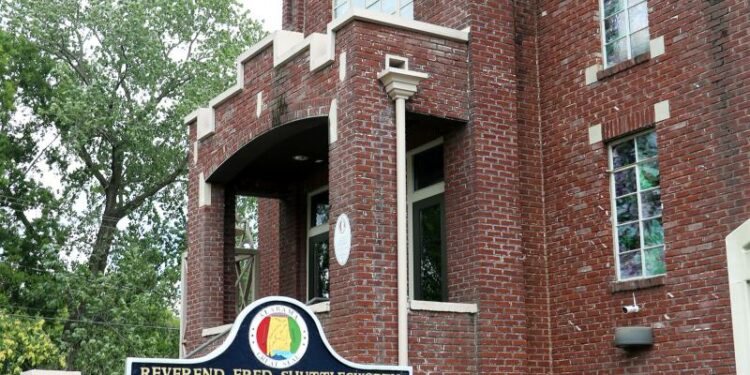A city of many facets, it is a wonderful place for travelers to explore in depth. With a regional population of 1.15 million, it is the 49th-most populous urban area in the United States. It possesses an extraordinarily interesting combination of modern commerce, museums, candid recognition of its checkered history and a commodious contemporary evolution of traditional southern hospitality.
From the post-Civil War Reconstruction era until the middle of the 20th century, Birmingham was the industrial hub of the South. When its steel industry declined, Birmingham was forced to modernize. Today, its economy is a locus for rail commerce, health care, banking, primary and fabricated metals manufacturing, tourism, distribution, financial services and emerging high-tech, enhanced by the influence of the University of Alabama at Birmingham.
 The Sloss Furnace National Historical Landmark is a restored blast furnace and steel-making facility showing a typical Birmingham industrial complex at the height of the steelmaking era of the previous century. Courtesy of the Greater Birmingham Convention and Visitors Bureau
The Sloss Furnace National Historical Landmark is a restored blast furnace and steel-making facility showing a typical Birmingham industrial complex at the height of the steelmaking era of the previous century. Courtesy of the Greater Birmingham Convention and Visitors Bureau
Birmingham does not ignore its history. It honors its industrial history with the restored Sloss Furnace historical site and statuary at Vulcan Park.
But the most prominent part of Birmingham’s historical consciousness is its honest recognition of its checkered history of segregation, racism and attempted suppression of the civil rights movement. Far from ignoring its past of Ku Klux Klan bombings, the brutality of Safety Director Bull Connor against civil rights marchers and the racial strife of the 1960s, Birmingham has memorialized them with a beautiful Birmingham Civil Rights Institute museum and an impressive interpretive park in what is now known as the civil rights district, now a national park.
Southern hospitality is also alive in 21st-century Birmingham. The city offers interesting museums, commodious lodging with beautiful boutique hotels and contemporary lodging palaces and a lively culinary scene. It lives up to its billing of itself as the “dinner table of the South.” The town abounds with great restaurants up and down the price and food choice spectrum.
Before You Go:
birminghamal.org/
theculturetrip.com/north-america/usa/alabama/articles/the-top-10-things-to-do-and-see-in-birmingham-alabama/
planetware.com/tourist-attractions-/birmingham-us-al-b.htm
suburbanturmoil.com/things-to-do-in-birmingham-alabama/2021/04/30/
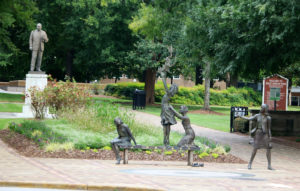 This sculpture in Kelly Ingram Park in the Birmingham Civil Rights District memorializes the four young girls killed when the 16th Street Baptist Church was bombed in 1963. Photo by Jeff Orenstein
This sculpture in Kelly Ingram Park in the Birmingham Civil Rights District memorializes the four young girls killed when the 16th Street Baptist Church was bombed in 1963. Photo by Jeff Orenstein
Getting There:
Birmingham can be easily reached by highway, air or train.
By car, Birmingham is at the junction of Interstate 20, Interstate 65 and Interstate 59.
By air, the nearest airport is Birmingham-Shuttlesworth International Airport (BHM), 6.9 miles away.
By train, the Amtrak station is centrally located less than a half-mile from downtown’s Railroad Park.
Mobile is the nearest cruise port, normally served by Carnival, 257 miles away. Check with Carnival dates for resumption of cruises from Mobile.
Must-Sees for a Short Trip:
The Civil Rights District, Kelly Ingram Park and the adjacent Birmingham Civil Rights Institute
The Sloss Furnace National Historical Landmark
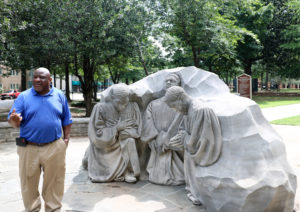 Tour guide and historian Barry McNealy in front of an impressive sculpture in the Birmingham National Civil Rights District. Photo by Jeff Orenstein
Tour guide and historian Barry McNealy in front of an impressive sculpture in the Birmingham National Civil Rights District. Photo by Jeff Orenstein
The 16th Street Baptist Church and the historic Bethel Baptist Church
A gourmet meal at the Hot and Hot Fish Club, Highlands Bar and Grill or other award-winning restaurants
A visit to Railroad Park, a delightful urban oasis
If You Have Several Days:
Vulcan Park and Museum
Barber Vintage Motorsports Museum
The Birmingham Botanical Gardens
Birmingham Museum of Art
Rufner Mountain
 Railroad Park is a popular venue for concerts, hikes, picnics and train-watching in the heart of Birmingham’s downtown. Photo by Fred Tucker
Railroad Park is a popular venue for concerts, hikes, picnics and train-watching in the heart of Birmingham’s downtown. Photo by Fred Tucker
Ginny O’s Tips for Dressing:
As a business center, dress is not overly casual during the day. People dress for dinner at upscale restaurants, although a coat and tie is not necessary. Tourists should think neat resort casual wear.
This Destination at a Glance:
Over 50 Advantage: Great food, an easy pace and history galore
Mobility Level: Moderate. There are some hills and
steps.
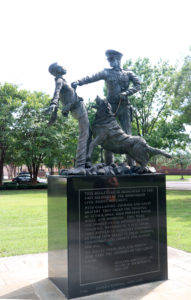 This sculpture in Kelly Ingram Park depicts the brutality of Bull Connor’s police against civil rights marchers, including children. Photo by Jeff Orenstein
This sculpture in Kelly Ingram Park depicts the brutality of Bull Connor’s police against civil rights marchers, including children. Photo by Jeff Orenstein
When to Go: The shoulder seasons of spring and fall are best. Summers are hot and humid, and winters, though generally mild, can be cold.
Where to Stay: The downtown Tutwiler Hotel is both elegant and convenient. Many other national chain hotels in several price ranges are in the vicinity.
Special Travel Interests: Civil rights and industrial history
Jewish Birmingham
Birmingham has the largest Jewish community in Alabama. About 6,300 of the approximately 10,000 Jews who call Alabama home reside in Birmingham, according to jewishdatabank.org. Most live on the city’s south side and are reasonably well-integrated into the city’s civic and business life.
When the city was established in the 1870s, Jews were among its first settlers. However Jewish communal life did not begin to develop in earnest until 1882, when Birmingham had a total population of about 3,100. Jewish merchants started most of Birmingham’s department stores, and Jews entered many other phases of civic life. In the financial panic of 1893, the Steiner brothers of Steiner Bank kept the city from going bankrupt.
In the 1920s, antisemitism flourished in the region, and the Ku Klux Klan presence in Birmingham grew to more than 20,000 members. The Klan’s anti-immigrant and anti-Semitic rhetoric, as well as its violent tactics, caused alarm among members of all three congregations.
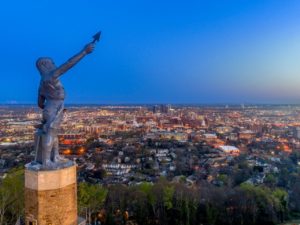 The statue of Vulcan, Roman god of fire overlooks Birmingham at Vulcan Park. Photo by Art Meripol
The statue of Vulcan, Roman god of fire overlooks Birmingham at Vulcan Park. Photo by Art Meripol
A bomb with enough dynamite to level a city block was discovered outside Temple Beth-El in 1958. It had malfunctioned just short of detonation. White supremacists also threatened numerous local Jews who spoke out on behalf of civil rights, and much anti-racial integration literature and sentiment was overtly antisemitic. Though they had a lot to fear, many local Jews worked behind the scenes to end racial strife and change the city’s form of government in the 1960s.
Despite its small size, the Birmingham Jewish community maintains five congregations and supports several Jewish institutions, including a Jewish Federation, a Jewish Foundation, the Levite JCC, the N.E. Miles Jewish Day School and a Jewish Family Services organization. The Deep South Jewish Voice newspaper started publication in 1990 and is now Southern Jewish Life Magazine.
The three historic congregations (Reform Temple Emanu-El and Orthodox congregations Knesseth Israel and Temple Beth-El) continue to prosper, and they have now been joined by a Chabad Center in Mountain Brook and the Or Hadash Humanistic Judaism Congregation, which meets in members’ homes.
Jeff and Virginia Orenstein are travel writers from Sarasota, Florida.
Source link : https://www.jewishexponent.com/birmingham-a-captivating-southern-crossroads/
Author :
Publish date : 2021-08-30 03:00:00
Copyright for syndicated content belongs to the linked Source.

